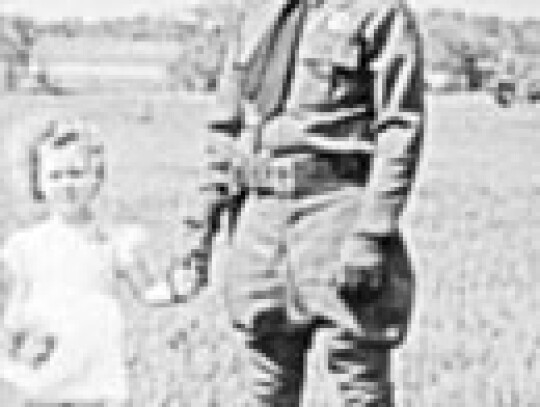Eagle Lake Remembers
The old school bell rang loudly through the hallways at the Eagle Lake High School building. It could be heard from several blocks away. Students rushed back from lunch knowing that the school assembly would begin promptly afterward. We would all be there, from grades 1-12. Today was a special day, as a local man was to give the program.
We younger children were up front near the stage and could see his shiny badge up close. The rim of his Stetson hat cast a shadow over his chiseled face and sandy hair, as he removed it to speak. We knew him as a friend to wildlife and nature and were spellbound as he began. His name was Tom Waddell. It was a familiar name practically anywhere you went in Texas. One classmate called him “Daddy Tom,” as he was her grandfather. The rest of us settled for “Mr. Tom.” It was always a name uttered with respect.
“Children,” he began, “it wasn’t so long ago that Eagle Lake abounded in wildlife. There were birds of every color and fish of every size. We had bears, minks, and foxes; and even a few panthers were known to cross our roads. Deer roamed abundantly, prairie chickens covered the flatlands, and waterfowl, even pink flamingoes graced our lake. We were home to thousands of creatures in their natural habitat. Then one day, we discovered that much of our native wildlife was gone. We knew that something was wrong, and that is why I am here to talk with you today.”
Thomas Tomkinson Waddell (1889-1982) was born in the village of Coatbridge, Scotland to Mary Tomkinson and John Jack Waddell. In his ninety-two years he became a legend in Texas for his ground-breaking work in wildlife conservation and environmental protection, at a time when their importance was scarcely recognized. He and his family came to America in 1890, through Ellis Island, first to Ohio, and later to Texas in 1905 and in 1913.
Waddell served as a State Game Warden for the Texas Parks and Wildlife Commission for thirty-three years. As a child, he was fascinated by hunting and fishing. He did both well. He knew both animal and plant life and observed the migratory habits of birds and the patterns of nature. His family came by real-estate train in 1905 to Rock Island, lured by the promise of low-cost land. Tom was 16. His parents bought 42 acres near Skull Creek where they raised their eight children; three boys and five girls. They grew crops and a garden, raised livestock, sold cucumbers to a local pickle company, and figs to a local canning company. The boys hunted for family food and fished in the creeks and the Colorado River.
After a few harsh years of farming and the damaging storm of 1909, the family returned to Ohio for continued work in a steel mill, this time in Akron. Here, Tom played professional baseball for the Akron Robins in 1909, and later played the new game of professional football for the Akron Indians in 1910 and 1911. They were National Champions in 1911. He earned $30 a game for extra pay.
Tom continued to play baseball upon his return to Texas and was among the first players inducted into the South Central Texas League’s Hall of Fame. He played semi-pro baseball and was on local teams. Tom married Alberta “Bird” Wilson in 1911, in Warren, Ohio. She was his devoted companion and staunch supporter. She was an invalid from 1934, as a result of an automobile accident. Their children were Ruth Waddell Reese, Mary Waddell Baker, and William R. Waddell. They had ten grandchildren.
When the Waddell family returned to Texas in 1913, they returned to Rock Island. Tom moved his family to Eldridge, and later to Calhoun to farm cotton, corn, and potatoes on the Faber plantation. They were warned of impending floods to the area due to heavy hill country rains that year, and like others, their farms were flooded, and crops were ruined. Tom moved to town and later became a successful rice farmer under the influence of his brother William.
In addition to his many talents, Tom Waddell was an avid sportsman and naturalist. He knew hunting and nature’s habitats first-hand. He had observed nesting habits, behavioral interactions of birdlife, mammal characteristics, and he became an “acute observer of wildlife.” He had seen the depleting of wildlife species and understood the importance of environmental education and wildlife conservation. His reputation and philosophy spread across the Gulf Coast area.
On July 1, 1925, he was commissioned as a Texas State Game Warden, serving until 1957, when he retired at 65. During his tenure, Tom Waddell drew hosts of journalists, photographers, naturalists, ecologists, birdwatchers, sportsmen, and scientists to the Eagle Lake area. University professors and their students came, along with museum directors, ornithologists, and several Texas governors and politicians. He was written about in magazines, newspapers, and journals in the state and nationally for his work.
Tom Waddell showed the need for understanding the fragility of nature, and how to conserve its wildlife. At first, he monitored almost the entire Gulf Coast area and had to travel through four or five counties to patrol and monitor hunting and wildlife habits. He was a no-nonsense game-warden, who applied the rules of conservation in all that he did. His influence was major between Houston and San Antonio. He gave his full-time activity to monitoring hunting, and teaching about nature and “his wildlife family.” He would apprehend abusers and violators of game laws and take them to jail, no matter their political importance.
Waddell patrolled the prairies, woodlands, rice fields, and farms. With little communication technology then, he still made his rounds, enforced the law, and observed the behavior of both wildlife and hunters. He helped to make conservation, wildlife, and environmental ecology a respected science. He spent much of his time educating and teaching through the boy and girl scouts; garden clubs, hunting clubs; civic organizations; schools, and churches. Young and old knew of Tom Waddell and his mission.
“Children,” he continued, “before we knew better, there were men as professional hunters who came to our area to kill deer and other wildlife for commercial purposes. One man alone was said to have killed nearly 20,000 deer in our area to sell the hides in the north. Another shot 70 alligators at one time from Eagle Lake to sell hides and meat. Others trapped fur-bearing animals to sell their pelts, even skunks; some killed white herons and other birds to sell the feathers for plumes for women’s hats. Many bird and wildlife species were eliminated before we were educated to the importance of establishing laws and regulations against over-hunting and over-killing our wildlife. Laws are needed and must be enforced. That is what a game warden helps to monitor. Your help is needed, too. We all must look out for our wildlife and their habitats.”
The Attwater Prairie Chicken species is an example of Tom Waddell’s groundwork. Once, these prairie chickens were abundant all over the coastal area. Now the species is almost depleted. “Mr. Tom” was a driving force in the negotiations for the protection of the prairie chicken habitat along the San Bernard River near Eagle Lake. When the Nature Conservancy and the World Wildlife Fund acquired the property around 1966, Tom Waddell became the manager of the area and its wildlife. Its importance led to the establishing of the Attwater Prairie Chicken National Wildlife Refuge, in 1972, by the U.S. Fish and Wildlife Service.
When Tom Waddell became Game Warden in 1925, he estimated that there were fewer than 125 deer in all of Colorado County. Professional hunters, lack of game laws, little conservation education, and few champions of wildlife management were causes of wildlife depletion. Until a viable program emerged with a visible advocate, the Gulf Coast area was at risk for serious depletion of species.
As the old school bell rang again at the end of the “assembly” the time had passed quickly while listening to “Mr. Tom,” and his stories of local wildlife. He invited us all to be his “partners” in understanding the value of preserving our wildlife family. We learned that day that there is a human stewardship which we must apply to the natural life all about us. No child left the room that day that wasn’t affected by the stories of how our responsible leadership is needed in every season, and in every aspect of our gifts of nature.
Tom Waddell was a protector, an enforcer, an educator, and a friend. Hopefully the children in his assembly on that day and others have passed along his stories to their children and to new generations.
Whether on the playing fields, in the rice fields, or in the sportsmen’s fields, Game Warden Tom Waddell made a difference in Eagle Lake and in the state of Texas. His badge still brightly shines. Thank you, “Mr. Tom.”
.jpg)



